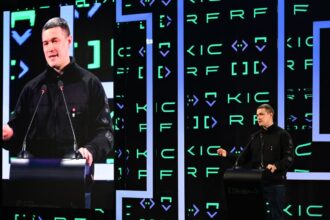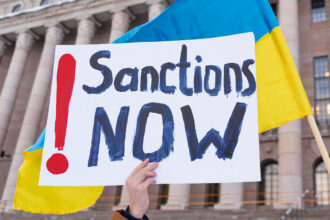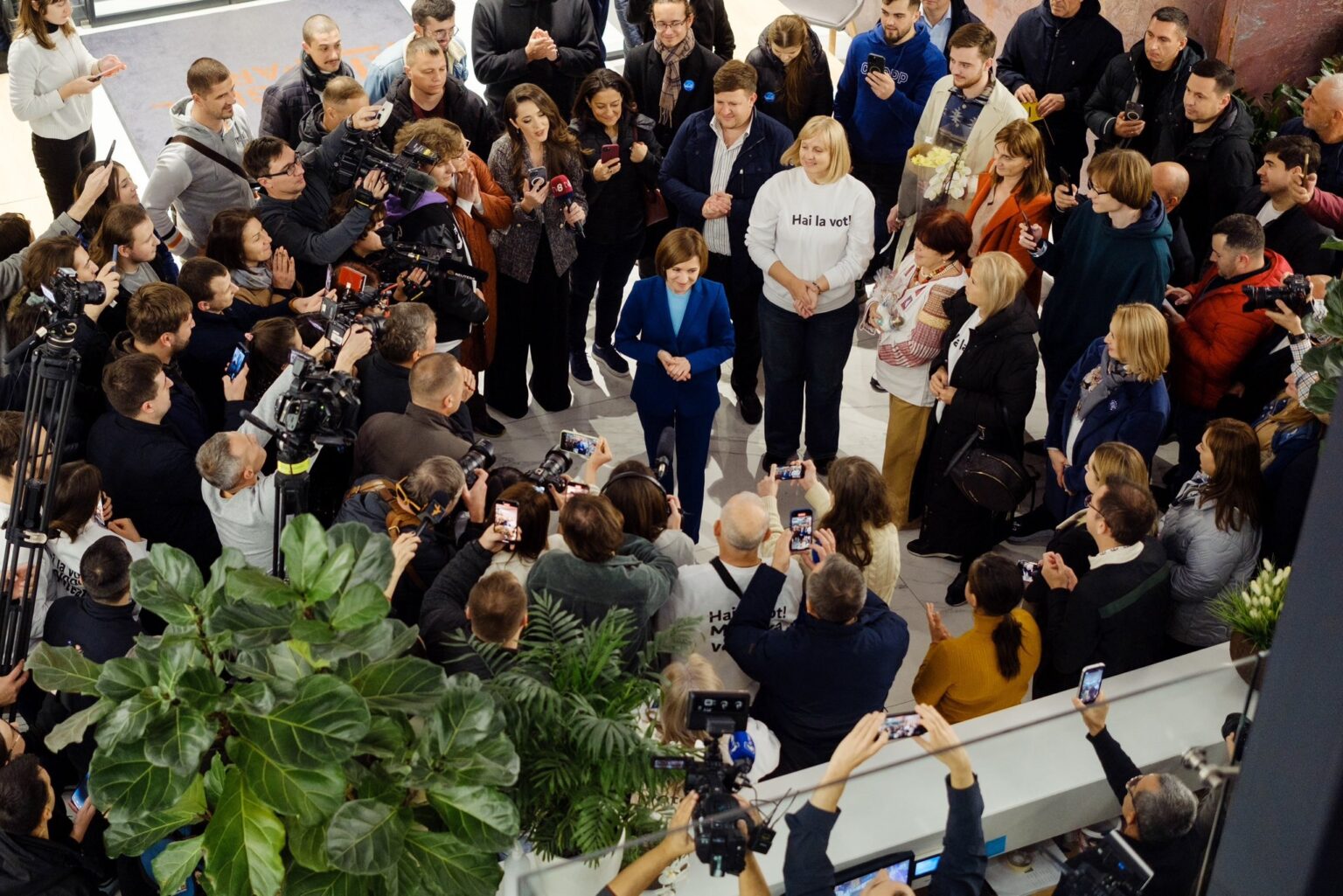Maia Sandu, who is pro-EU and pro-EU, won the run-off for Moldova’s presidency over pro-Russian Stoianoglo. She secured victory with strong support from the diaspora despite trailing by 2.4% domestically.
Maia Sandu, the pro-EU president of Moldova, has been re-elected in a decisive victory in the second round. She is now the first head-of-state in the history of the country to win a second term in direct elections.
Transnistria is a region of Moldova that is situated between Romania, a NATO and EU member state, and Ukraine. It has been under Russian influence since the early 1990s, with Russian troops stationed in Transnistria. Russia has been trying to bring Moldova back under its influence for years, destabilizing its pro-EU government to install pro-Russian allies at the top.
The Central Electoral Commission of Moldova reported that, with 100% of the votes counted, Sandu, who represents the Action and Solidarity Party, (PAS), received 55.33% of her vote, while Alexandr Stoianglo, of the Socialist Party, received 44.67%.
The turnout was 54,30%, with 1.7 million participants, including 328,000 voters from outside of the country. Women accounted for 54.79% of the voters, and men 45.21%. The most active demographic was voters aged 36-65.
Stoianoglo and Russia
The socialist Alexandr Stoianoglo refused to amend the Constitution of Moldova to commit to EU Membership, despite professing his support for “European Aspirations” during the 2024 EU Membership referendum. His campaign promised a “balanced foreign policy” with the EU and US, Russia and China and promised to restore cheap Russian gas.
Based on a leak by Lubyanka Leaks (a website that publishes leaked documents), EU Reporter claimed that the Kremlin was secretly managing and financing the campaign of Moldovan Presidential Candidate Alexandr Stoianoglo. Audio recordings allegedly revealed FSB connections as well as Russian influence in the Moldovan politics landscape.
In October, the referendum on EU membership in Moldova narrowly passed, with 50.08% of support. Sandu, however, received 42.5%, falling short of a majority, and triggering a second round. Opinion polls conducted before the vote showed a significantly higher level of support for EU integration than Sandu
Sandu claimed that her government had “clear proof” of vote-buying at an “unprecedented level.” She claimed that funds from Russia were funneled through fugitive pro-Russian oligarch Ilan Sor, who was convicted. Moldovan police revealed a large-scale plan allegedly orchestrated by Sor. It involved $39 million worth of transfers to influence the elections.
IPN reported in a campaign advertisement that Maia Sandu claimed that Stoianoglo was funded by “foreign”, meaning Russian, sources and not directly by Moldova’s former pro-Russian President Igor Dodon and fugitive businessmen Ilan Sor, Veaceslav Plato, and Veaceslav Platon. She called Stoianoglo a “Trojan Horse”
“We know who is hiding in this Trojan Horse–Platon Sor Dodon-but we do not know who else could be involved,” Sandu said, claiming that the money was intended to destabilize Moldova by creating internal division.
Sor and Platon, both wanted by Moldovan law enforcers, are hiding in Russia.
After the second round of elections, the Central Electoral Commission of Moldova reported 225 violations. These included ballot photography, campaigning activities, suspected voter bribery and organized transports of voters to the polling stations. The commission also noted that false bomb threats were made at polling stations, both at home and abroad, and at a bridge connecting two towns.
Donald Tusk, the Polish Prime Minister, commented on the results. He noted that Sandu defeated “Moscow‘s favorite” in spite of what he called the “aggressive Russian interference.”
Divided society and historical opportunity
Delfi.ee editorial suggests that this win presents Moldova with an “historic opportunity” for it to move decisively away from Russian influence. The publication warns Sandu and her supporters to understand why they were “on the edge of a abyss in the last months”, referring to the narrow margin at the recent EU Integration referendum.
NewsMaker.md, a local Moldovan publication, reveals a deeply polarized society in its analysis, describing the “two Moldovas”. The publication reports that, while Sandu won an overall victory by an 11% margin (182,000 votes), Stoianglo was ahead by 2.4% (32,000 vote) within Moldova, with Sandu’s win ultimately secured by diaspora votes.
The news outlet attributes the victory of Alexandr Stoianoglo to the sharp economic divide between the urban and rural population.
NewsMaker.md reports that one “Moldova”, a group of relatively wealthy citizens residing primarily in Chisinau’s capital and abroad, strongly supports European integration. The other “Moldova”, on the other hand, is made up of residents from villages and district centres that are emptying out. Many lack basic amenities and struggle with low salaries or minimal pensions.
NewsMaker.md states that “these people don’t necessarily oppose Moldova’s European Path,” but they do not feel its benefits. This “other” Moldova often votes pro-Russian. They are angry about the ban on TV channels, the demonization and favoritism of certain politicians, as well as the pressure to favor Russia over the EU.
The analysis states that “for much of the country, immediate life quality outweighs the geopolitical direction.”
The publication stresses that Sandu’s second mandate will be a crucial one for bridging the social and economic divides in the country. Sandu promised to be the “president of all citizen” in her victory speech after the campaign, which has only deepened polarization between “two Moldovas”, it concludes.
International Reactions
Sandu’s win was hailed by European leaders as it became apparent that Stoianoglo would not be able to secure the victory with only 5% of votes remaining. Ursula von der Leyen, President of the European Commission, congratulated Sandu and said she was happy to continue working together with her for a European future.
Roberta Metsola, President of the European Parliament, recognized the leadership of the Moldovan president in the fight for democracy and the rule-of-law, as well as Moldova’s European Future. Metsola said that Europe will continue to stand by Moldova on this journey.
Emmanuel Macron, the French president, declared that democracy had triumphed against all interference and maneuvers. He congratulated Sandu on her reelection as Moldova’s leader. Macron said France would continue to support Moldova on its European journey.
The Romanian Prime Minister Marcel Ciolacu said that Sandu’s win was a clear demonstration of the Moldovan people’s desire to defend democracy and secure a path to EU membership. Ciolacu praised Moldovans around the world for their courage and confidence, fighting against Russia’s attempts to undermine democracy by large-scale vote-buying.
The next day, Ukrainian President Volodymyr Zelenskyy congratulated Sandu and stressed that Ukraine supports the European Choice of the Moldovan People and is willing to work together to reinforce the partnership.
Both Moldova and Ukraine achieved EU candidate status after EU leaders met at the European Council on 23 June 2022. Their paths to EU accession were further aligned by the European Council’s decision on 14 December 2023 to open accession talks for both countries. This set them on parallel tracks toward EU membership.
Salome Zourabichvili, the Georgian president, greeted Sandu and said that her victory was also Georgia’s. Zourabichvili said that the Moldovan elections were the best proof of recent stolen elections in Georgia where the large diaspora had been barred from voting.
Klaus Iohannis, the Romanian president, also welcomed Sandu Sandu’s victory in the election. He said that the Romanian people stood with the Moldovan citizens in this success which irreversibly anchors Moldova’s destiny within the European family.
Read More @ euromaidanpress.com




